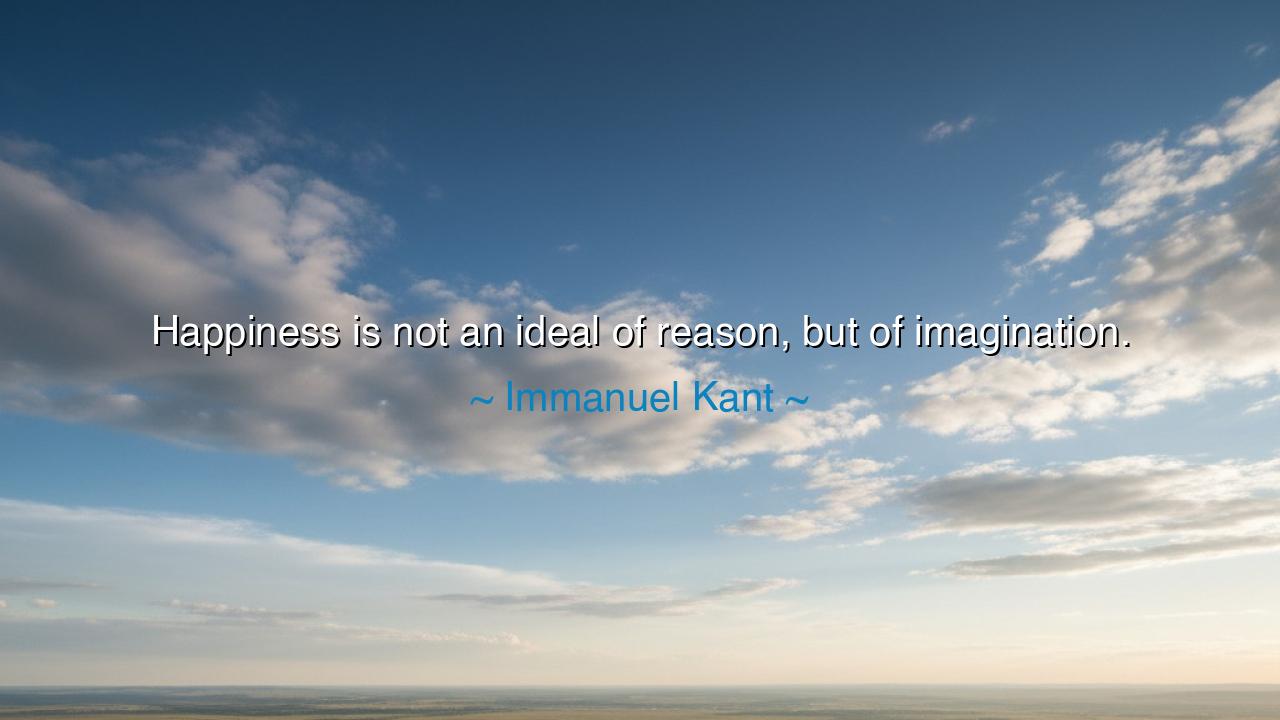
Happiness is not an ideal of reason, but of imagination.






“Happiness is not an ideal of reason, but of imagination.” Thus declared Immanuel Kant, the philosopher who sought to build a bridge between the seen and the unseen, between the mind that thinks and the soul that dreams. His words carry the ring of eternal truth — that happiness, that shimmering treasure all men seek, cannot be measured, calculated, or reasoned into existence. It belongs not to logic, but to the realm of imagination, where the heart paints its own picture of what it means to live well and fully. Reason can measure the path, but only imagination can reveal the destination.
Kant, the austere sage of Königsberg, lived a life of discipline, order, and thought. Yet even he, who placed reason above all else in the search for truth, knew that happiness cannot be found through reason’s cold arithmetic. For reason asks, “What is useful? What is prudent? What is safe?” But happiness whispers, “What makes the soul sing?” It is the dreamer, not the logician, who first imagines joy. In this way, Kant teaches that happiness is not a formula to be solved, but a vision — a creation of the mind’s eye that gives shape to our desires, hopes, and meanings.
To understand his insight, we must first see what he meant by reason and imagination. Reason is the architect of order — it builds the structures of law, science, and morality. Imagination, however, is the fire of creation — it fills those structures with life and color. Reason tells us what we ought to do; imagination tells us why it matters. And thus, when Kant says that happiness is not an ideal of reason, he means that it cannot be universally defined or achieved through logic alone. Each heart must imagine its own happiness, for it is born from the unique poetry of one’s inner world.
Consider the life of Vincent van Gogh, whose reason often failed him, yet whose imagination burned with a divine flame. His world was filled with hardship, rejection, and loneliness — by reason’s measure, he was far from happiness. Yet in his imagination, he painted the skies alive with swirling stars, the sunflowers bursting with life, the fields trembling with light. Through his art, he discovered a happiness of spirit, a transcendent joy that no earthly success could provide. His was not the happiness of reason — of comfort or stability — but of imagination: the deep fulfillment that comes when the soul creates beauty from pain.
This is what Kant’s wisdom reveals — that imagination gives happiness its shape. For what is happiness but the vision of a life worth living? The farmer imagines peace in the sound of rain upon his fields. The scholar imagines joy in the quiet pursuit of truth. The mother imagines happiness in her child’s laughter. Each soul conceives its own paradise. Reason can show the means, but imagination shows the meaning. Without imagination, happiness is an empty word; with it, even sorrow can become sacred.
Yet Kant’s insight is also a warning. When imagination is left untamed, it can lead us astray — into fantasies that no reality can satisfy. Thus, the wise must balance imagination with understanding, lest they chase illusions forever. Reason must guide imagination like a rudder guides a ship; imagination must give reason wings. True happiness arises when both are in harmony — when the dream of the heart finds its rightful place within the world of action.
So, dear seeker, learn this: do not seek happiness in logic alone, nor abandon yourself to dreams without purpose. Let your imagination show you what a good life could be — and let your reason help you build it. Picture the joy you desire, not as luxury or indulgence, but as a state of being that flows from living in truth. Imagine beauty, create meaning, and walk steadily toward it. For it is imagination that gives light to the path of reason, and together they lead to wisdom.
In the end, Kant’s words remind us that happiness is not a discovery, but an invention — a sacred act of imagination that each soul must perform for itself. You cannot reason yourself into joy; you must dream it, shape it, live it. And when imagination and reason walk hand in hand, happiness ceases to be a pursuit — it becomes a presence, quietly blooming in the garden of a well-lived life.






AAdministratorAdministrator
Welcome, honored guests. Please leave a comment, we will respond soon